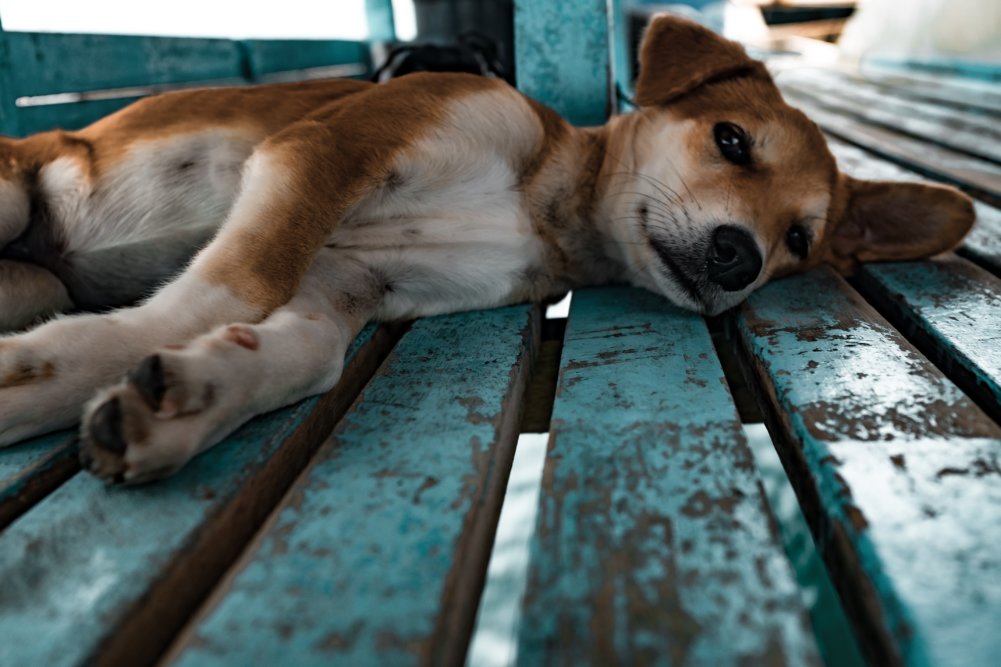Table of Contents
Last Updated on February 16, 2023
Recently, I noticed that there is a hard lump that is appearing on my dog’s rib cage. The lump is large, and it does not really move around when I start to press on it. Interestingly, it did not really affect her motor skills as she is still running and jumping about. The hard lump on the dog’s rib cage is obviously a concern for us as we are totally clueless about the nature of the lump. You see, if the lump appeared on humans, we could quickly reach the conclusion that it is indeed a bad sign. However, for the case of dogs, we will need further investigation to find out the cause of the hard lump on dog’s rib cage, and, fingers crossed, determine if it is indeed a health concern or not. The question now is, what exactly is the growth? Are they cancerous in nature? Is it just a sebaceous cyst?
Hard Lump On Dog’s Rib Cage
 If you notice that the lump on your dog’s rib cage is not soft and squishy, then most likely it is not a lipoma (fatty lump). A lipoma is actually a benign fatty mass that is actually a tumor. This tumor will not affect your dog’s health. To correctly identify the lipoma, you will notice that the lump itself is soft and movable. It usually appears just under the skin. It can be surgically removed, but since it does not contain cancer cells, you can leave it untreated. However, if the lump is starting to restrict your dog’s movement, then you will need to remove it.
If you notice that the lump on your dog’s rib cage is not soft and squishy, then most likely it is not a lipoma (fatty lump). A lipoma is actually a benign fatty mass that is actually a tumor. This tumor will not affect your dog’s health. To correctly identify the lipoma, you will notice that the lump itself is soft and movable. It usually appears just under the skin. It can be surgically removed, but since it does not contain cancer cells, you can leave it untreated. However, if the lump is starting to restrict your dog’s movement, then you will need to remove it.
For my dog’s case, since its a hard lump, I will need to take further action. It is really scary experience for me since this is the first time that my dog has gone through this procedure. Indeed, it is pretty common to find such lumps in older dogs too. After visiting my vet, my dog is diagnosed with having malignant cancer. They, of course, did some tests on it, using the fine needle aspirate procedure to determine if the tumor is benign or malignant in nature. Here is how the vet will usually determine the nature of the tumor itself. But before that, here are some of the possible causes of hard lumps on your dog’s rib cage.
- Lipomas
One possible cause of a hard lump on your dog’s rib cage is a lipoma. Lipomas are fatty tumors that are typically harmless, but it’s important to have them checked by a vet to rule out any potential complications. Lipomas can occur anywhere on your dog’s body, including their rib cage. They usually feel soft and squishy, but in some cases, they can feel hard and firm to the touch.
- Cysts
Another possible cause of a hard lump on your dog’s rib cage is a cyst. Cysts are typically filled with fluid or other material and can occur anywhere on your dog’s body. They may feel hard or soft, depending on the contents of the cyst. In some cases, a cyst can become infected, so it’s important to have any new lumps or bumps checked by a vet.
- Mast Cell Tumors
Mast cell tumors are a type of cancer that can occur in dogs. They can appear as a single lump or a cluster of lumps and can be found anywhere on your dog’s body, including their rib cage. Mast cell tumors can feel soft or hard and can be itchy or painful for your dog. It’s important to have any new lumps or bumps checked by a vet, especially if you suspect it might be a mast cell tumor.
- Osteosarcoma
Osteosarcoma is a type of bone cancer that can occur in dogs. It can cause a hard lump on your dog’s rib cage, and it’s important to have it checked by a vet as soon as possible. Osteosarcoma is a serious condition that requires immediate attention.
- Abscesses
An abscess is a collection of pus that can occur in dogs due to an infection. They can be caused by a variety of factors, including injuries and bites from other animals. Abscesses can appear as hard lumps on your dog’s rib cage, and they may be painful to the touch. It’s important to have any new lumps or bumps checked by a vet to rule out an abscess.
How Do Vets Determine Nature Of Tumour
To determine the nature of the tumor, the vet will usually palpate the mass and observe the reaction. If it is soft and squishy, then the vet will not recommend going for surgical removal, unless the lump is affecting your dog’s movement. If the lump is hard, just like my dog’s lump on the rib cage, then more tests will be needed to determine if the tumor is cancerous in nature or not.
To do the test, basic diagnostics will be needed. Even for doctors, when they wish to analyze the nature of the tumor, they will take sample cells from the tumor cells and put them under the microscope. This is where professional analysis can be done in a very comprehensive manner. Of course, to go a little further, tests can be done by the pathologist, which will eventually determine the nature of the mass. Whether it is eventually a benign or malignant tumor, the vet will usually recommend that your dog’s tumor be surgically removed.
There are several other tests that can run on your dog to determine the underlying cause of the tumor as well as the discovery of other inherent illnesses that you might not be aware of. Usually, the vet will run blood tests on the dog, which will reveal its blood chemistry, as well as the red and white blood cells, count. Urinalysis will also be done, as it can uncover problems such as liver failure.
To determine if metastasis is present or not the vet should recommend radiographs to be done. However, you can always ask your vet to conduct a full ultrasound test. The ultrasound test is perhaps the most damning test of all, as it can allow the vet to have a complete view of the internal organs, which will help to detect the early onset of tumors or other abnormalities.
Once the doctor determines that there is indeed a tumor, he can conduct the CT scan or MRI. This procedure is not alien to humans, as we do conduct MRIs to determine the structure of the tumor itself.
Conclusion
If you notice a hard lump on your dog’s rib cage, it’s important to schedule an appointment with your veterinarian as soon as possible. Your vet will likely perform a physical exam and may recommend further testing, such as a biopsy or imaging, to determine the cause of the lump. Treatment will depend on the underlying cause of the lump and may include surgery, chemotherapy, or other medications.
In conclusion, while a hard lump on your dog’s rib cage can be concerning, there are several possible causes. Lipomas, cysts, mast cell tumors, osteosarcoma, and abscesses are all potential culprits. It’s important to have any new lumps or bumps checked by a veterinarian to rule out any serious underlying conditions. With prompt attention and proper treatment, most dogs can make a full recovery.

